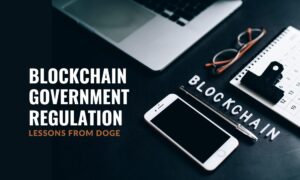
Henzelene Healley, Managing Partner of VA Consultants, speaks at Future Blockchain Summit in Dubai
At the Virtual Assets Regulatory Townhall at Future Blockchain Summit held at Dubai Harbour, experts from around the world gathered to debate the current state and future of regulatory frameworks in the crypto and blockchain industry. The discussion centred around the complexities of regulating a rapidly evolving sector and the impact of regulation on innovation and investment.
The Necessity of Regulation for Growth and Protection
Dr. Lisa Cameron opened the discussion by emphasizing the inevitability of regulation in the crypto sector. “Regulation is happening. Whether people like it or not, it will be happening,” she stated. Dr. Cameron highlighted that clear regulatory strategies are essential for companies to understand compliance expectations and to foster innovation. She pointed out that since the introduction of regulatory frameworks like the EU’s Markets in Crypto-Assets Regulation (MiCA), investment in the sector has “grown exponentially.”
She also stressed the importance of consumer protection. “With regulation, you have some consumer protection,” Dr. Cameron noted. She explained that regulations provide mechanisms for redress when individuals fall victim to scams or fraudulent activities. This protection is crucial for building trust in the industry and encouraging broader participation.
Balancing Innovation with Compliance
Magnus Jones offered a nuanced perspective, acknowledging the necessity of regulation while cautioning against over-regulation that could stifle innovation. “I’m not against regulation because there’s a necessity that we need to have in place; that’s obvious,” he said. However, he expressed concerns that current regulations like MiCA might not effectively drive innovation. “They’re not driving innovation at all with MiCA,” he contended.
Jones highlighted the challenges faced by startups under stringent regulatory frameworks. “As a startup, ironically, the EU says we are here to have sort of three main pillars of protecting the consumers, ensuring financial stability, and driving innovation. But they’re not driving innovation at all,” he argued. He pointed out that the cost and complexity of compliance could hinder new entrants and push innovation outside regulated markets.
He advocated for a more flexible approach that considers the diverse nature of blockchain technologies. “We cannot just draw up a framework with four corners, apparently, that doesn’t fit all these categories of different players we have because it will not work,” Jones stated. He emphasized the importance of updated guidance and open dialogue between regulators and industry participants to navigate the evolving landscape effectively.

The Importance of Industry Collaboration in Regulation
Henzie Healley emphasized the critical role of industry expertise in shaping effective regulations. “When regulators are creating regulations, I would say that it’s always good for them to actually have technical people as well, or have people that are operating within the industry to almost give them the insights on how it is from an operational standpoint and not just a legislative one,” she suggested.
Healley praised the regulatory approach of the United Arab Emirates (UAE), noting that it strikes a balance between oversight and innovation. “What the UAE does is they create a framework, yes, but it’s not too tight. So it gives that overview, but then there’s enough room to move as the space grows,” she explained. This flexibility allows businesses to operate freely while ensuring compliance, making the UAE an attractive destination for crypto and blockchain companies.
She also highlighted the importance of regulators being accessible and open to dialogue. “They’re super supportive, right? And there’s always people you can contact,” Healley said about the UAE regulators. This collaborative environment fosters innovation and helps regulators stay informed about technological advancements.
Challenges Faced by Regulators
The panelists acknowledged that regulators often lack the resources and expertise to keep pace with rapid technological developments. Dr. Cameron pointed out, “I think they are trying to recruit lots of people from industry to inform their practice.” However, she noted the difficulty in retaining talent when the private sector offers more competitive compensation.
She stressed the need for ongoing education among legislators and regulators. “We have a huge job to do, to educate those who are going to be making the laws,” Dr. Cameron said. She shared experiences where members of parliament were unfamiliar with basic industry terms, underscoring the importance of education in forming effective regulations.
Magnus Jones added that technology will always outpace regulation. “Technology will always move faster than governments and regulation in general. That’s just the nature of the game,” he observed. He suggested that regulators should focus on building internal competence and collaborating with industry experts to develop more practical guidelines.
Global Cooperation and the Future of Regulation
Dr. Cameron emphasized the global nature of the crypto and blockchain industry and the need for international cooperation. “This sector is a global sector, so it’s going to be very, very important that those who are forming the legislation and engaging with the regulators and the businesses understand,” she stated. Through her work with the Global Legislators Forum, she aims to bring together lawmakers from different jurisdictions to share best practices and promote interoperability.
The panelists agreed that a collaborative approach is essential for effective regulation. As Healley put it, “It’s a team sport. Whether it be regulators, industry players, lawyers, accountants, whatever, it’s a team sport.” By working together, stakeholders can create a regulatory environment that protects consumers without hindering innovation.
The discussion highlighted the delicate balance between regulation and innovation in the crypto and blockchain industry. While regulation is necessary for consumer protection and market stability, overly rigid frameworks can impede technological advancement and drive innovation elsewhere. Effective regulation requires collaboration between regulators and industry experts, flexibility to adapt to new technologies, and a global perspective to address the borderless nature of digital assets.

The Virtual Assets Regulatory Townhall Panel at Future Blockchain Summit From Left: Kristi Swartz – DLA Piper, Dr. Lisa Cameron, – Global Legislators Forum in Digital Assets, Reinis Znotins – Latvian Blockchain Association, Sourabh Kumar – World Crypto Council, Henzie Heally – VA Consultants, Magnus Jones – European Web3 Organisation, Irina Heaver , NEOSLEGAL
As the industry continues to evolve, ongoing dialogue and education will be crucial. Regulators must stay informed about technological advancements, and industry participants should engage proactively with policymakers. By fostering mutual understanding and cooperation, it is possible to develop regulations that support both innovation and consumer protection, ensuring a sustainable and prosperous future for the crypto and blockchain sectors.


































